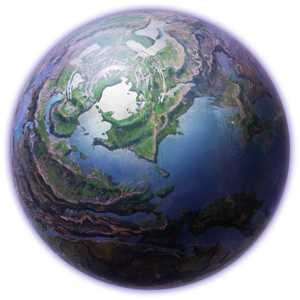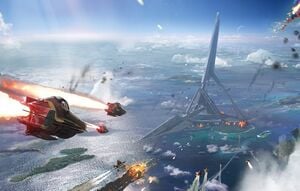Janjur Qom
From Halopedia, the Halo wiki
| Janjur Qom | |
|---|---|

| |
| Astrographical | |
|
System: |
|
|
Orbiting: |
|
|
Orbital position: |
Second planet[1] |
|
Moon(s): |
|
| Physical | |
|
Diameter: |
11,698 kilometers (7,269 mi)[1] |
|
Gravity: |
Over 0.95 Gs[3] |
|
Length of day: |
30 hours[4] |
|
Length of year: |
290 days[4] |
| Societal | |
|
Species: |
|
|
Population: |
500 million (at reseeding) |
|
Government: |
|
Janjur Qom was a predominantly jungle world of the three inner planets in the Qom Yaekesh system and the homeworld of the San'Shyuum.[5] The planet was orbited by one natural satellite, Plaon.[2]
History[edit]
Prehistory[edit]
The San'Shyuum evolved on Janjur Qom, and the race eventually became a space-faring race. Following the surrender of the San'Shyuum in the human-Forerunner wars, Janjur Qom and another San'Shyuum-inhabited world in its system were placed under a quarantine shield, monitored by the Forerunner warship Deep Reverence.[6] The San'Shyuum were not allowed to leave the system, but were permitted to travel between Janjur Qom, their other world, and both planets' natural satellites.[7] Janjur Qom was the largest of the San'Shyuum quarantine worlds.[8]
Late into the Forerunner-Flood war, the Librarian came to Janjur Qom to collect specimens of the San'Shyuum for preservation on Installation 00. The San'Shyuum, terrified by the thought of an impending cataclysm, attempted to rise up against the Forerunner defenses surrounding their system. They were unsuccessful, and later the entire planet was sterilized in a cruel act of punishment by one of the Master Builder's Halo installations. The San'Shyuum species was preserved, however, and would be reseeded on their planet after the Array was fired at the conclusion of the war. Their population was five hundred million after the activation of the Halo Array.[9]
War of Wills[edit]
- Main article: War of Wills
With their former relationship with the Forerunners all but forgotten, the San'Shyuum came to regard the Forerunners as gods, and worshiped their technology as gifts left behind for other races. The greatest of these relics was the Dreadnought, a fully functional keyship, possibly the last in the galaxy.[10] The keyship had crash-landed on the planet after Mendicant Bias attempted to use it to aid humanity.[11] Because of the presence of easily accessible Forerunner relics on the planet, the San'Shyuum advanced faster than most of the other races in the galaxy. However, the San'Shyuum came to regard the Dreadnought as too holy to explore in depth.[10]
This policy was maintained until 2200 BCE, when a group of San'Shyuum known as the Reformists demanded they be given access to the Dreadnought. This was anathema to the Stoics who maintained the belief of reverence. For the next one hundred years, the San'Shyuum engaged in internal conflict. The war ended in 2100 BCE, when one thousand Reformists barricaded themselves in the Dreadnought. As the Stoics were unwilling to destroy the object they revered, they were indecisive over what to do. This allowed the Reformers to activate the Dreadnought and leave, taking a huge chunk of the planet with them. The Stoics cursed the Reformists to exile, never to return. The Reformists would later go on to be ancestors of those who fought with the Sangheili and become the first Prophets of the Covenant.[12] With the departure of the Reformists, the Stoics were left as the dominant civilization on Janjur Qom.[13]
Later history[edit]
After the formation of the Covenant, High Charity, a mobile planetoid made out of the chunk of rock and powered by the Dreadnought, became the new homeworld of the Reformist line of San'Shyuum. The San'Shyuum continued keep tabs on their homeworld by sending Eye spy drones to the planet to monitor the Stoics' technological progress. In 850 BCE, the Covenant ordered an expedition to Janjur Qom to acquire healthy females in order to maintain their genetic diversity on High Charity, as well as to retrieve a prized Forerunner artifact—a Luminary.[14] A team led by the Prophet of Inner Conviction traveled to the planet and managed to obtain the Luminary and the Purifying Vision of the Holy Path in the grotto of the Great Transition.[3] After arriving at the village of Crellum to retrieve the females, the team was attacked by Stoic soldiers. When the group managed to kill the Stoics, the survivors retreated into their corvette Vengeful Vitality. As they prepared to leave the planet, the Stoics fired a missile at the ship and damaged it. Although the Luminary was destroyed in Janjur Qom's atmosphere during the attack, the Covenant ship managed to escape to High Charity.[15]
The San'Shyuum later claimed to the rest of the Covenant that Janjur Qom was destroyed when its star allegedly collapsed upon itself in 648 BCE.[16]
Topography[edit]
Because the San'Shyuum do not discuss their culture with other races, very little is known of Janjur Qom, other than that it has a slightly lower gravity than Earth[17] but higher than the gravity of High Charity. The atmosphere of the planet was similar to that of Earth and Sanghelios,[4] and is breathable to Sangheili.[3] Janjur Qom was a water-rich planet. Its distance from its star put it in a temperate zone that only allowed Janjur Qom to have a narrow range of weather.[18]
Large parts of the planet remain burned and desolate wastelands, scars from the Forerunner attack against the San'Shyuum uprising over 100,000 years ago. Dark green vegetation and jungles with high canopies covered most of the planet's main continent, while the landmass' outer edges were more rugged and rocky.[13] The rockier regions of the planet held Forerunner and prehistoric San'Shyuum artifacts and facilities, but their excavation was prohibited by the Stoics.[4] Janjur Qom had many jungles and forests, many of which were covered in vines and surrounded by the planet's strange flora. The jungles of Janjur Qom were noted for giving off a scent of decay and new life.[3] When the Forerunner Dreadnought departed Janjur Qom, the keyship took a huge chunk of the planet with it. The crater that was left behind was filled in by the Great Apothtea, an immense sea.[13]
Locations[edit]
Ecology[edit]

Janjur Qom had many diverse species of plants and animals. The many large creatures of the planet forced the Stoics to retreat to relatively small settlements.[3] Numerous creatures capable of flight were native to the planet,[3] such as the bony-winged rakscraja that often dwelled in the vine-covered trees of Janjur Qom.[19] Animals, such as the garfren, were domesticated by the San'Shyuum for meat, cheese, milk, and furs.[20] The ilpdor were massive carnivorous amphibians that were native to the swamps and lakes of Janjur Qom. Although they typically ate the fish that lived in the waters of the planet, ilpdor were known to eat San'Shyuum.[21] Nelosh were long-necked, aquatic creatures that were weightless and had the ability to float through the air.[22] Another marine animal was the eilifula, a creature with a humpbacked shell that lived in the planet's oceans.[23] Tiny, insect-like creatures that were capable of flight sucked the blood of hosts. These creatures appeared to be similar to Earth's mosquitos, although these animals had the ability to seemingly combine their legs with their wings.[3]
The vegetation on Janjur Qom was very unique. The planet's jungles were made up of flora that were green, argent, and turquoise in color.[3] Various species of plants acted similar to animals in behavior. Hedge-like foliage rustled when individuals came close to it, but quieted down when the being passed. Tentacle-like vines would occasionally stretch out from the foliage, and stroked nearby individuals to seemingly inspect them. Another species of plant had blossoms that stretched towards nearby beings and then opened its petals to "view" them. A thick, dense, brown plant species coated the tops of cliffs on Janjur Qom.[3] Notably, the folasteeds were various species of vegetation that combined to form steeds under their riders. Apparently the result of Stoic gene-forging, the folasteeds were able to attack beings by using vines to rip them apart.[21]
Trivia[edit]
The Bestarium gives the implication the San'Shyuum may have been lying about the destruction of their homeworld, possibly due to lingering distrust of the Sangheili. However, it also notes that such a conspiracy would be difficult to maintain for thousands of years.[9]
List of appearances[edit]
- Halo: The Flood (First mentioned)
- Halo 3
- Bestiarum (Mentioned only)
- Halo: Contact Harvest (Mentioned only)
- Halo: Evolutions
- Wages of Sin (Indirect mention)
- Halo: Cryptum (First appearance)
- Halo: Primordium
- Halo: Broken Circle
- Halo: Shadow of Intent (Mentioned only)
- Halo Mythos
- Halo: Shadows of Reach
- Sacrifice (Indirect mention)
- Halo: Point of Light (Mentioned only)
- Halo: Epitaph (Mentioned only)
Sources[edit]
- ^ a b c d Halo Encyclopedia (2022 edition), page 196
- ^ a b Halo: Broken Circle, Chapter 9
- ^ a b c d e f g h i Halo: Broken Circle, Chapter 7
- ^ a b c d Halo Waypoint: Janjur Qom
- ^ Halo: Cryptum, page 203
- ^ Halo: Cryptum, pages 182-183
- ^ Halo: Cryptum, page 210
- ^ Halo Waypoint, Cryptum Glossary (Retrieved on Mar 14, 2014) [local archive] [external archive]
- ^ a b Halo 3, Bestiarum
- ^ a b Halo Encyclopedia (2009 edition), page 115
- ^ Halo Waypoint: Mendicant Bias
- ^ Halo: Contact Harvest, pages 262-264
- ^ a b c Halo: Broken Circle, Chapter 6
- ^ Halo: Broken Circle, Chapter 3
- ^ Halo: Broken Circle, Chapter 12
- ^ Halo Encyclopedia: The Definitive Guide to the Halo Universe, page 119
- ^ Halo Encyclopedia: The Definitive Guide to the Halo Universe, page 298
- ^ Halo: Cryptum, page 144
- ^ Halo: Broken Circle, Chapter 1
- ^ Halo: Broken Circle, Chapter 10
- ^ a b Halo: Broken Circle, Chapter 11
- ^ Halo: Broken Circle, Chapter 20
- ^ Halo: Broken Circle, Chapter 5

